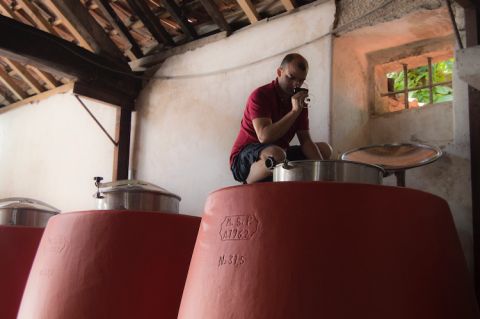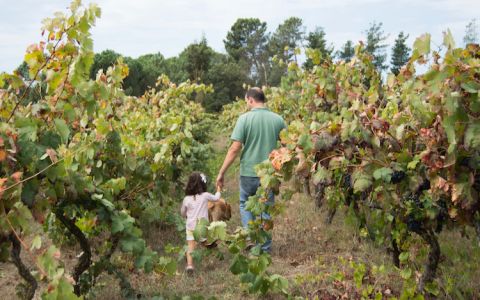From 174.90 Norwegian kroner, $18.99, £22, AU$41.40
Carlos Raposo is a young man from Portugal's Dão region who loves to learn, even at great personal cost. However, he told me, as a teenager he felt lost, not knowing what he should do. Then at the age of 16, in his first year of a very practical course at the agricultural high school in Bairrada, he fell in love with winemaking. Then he knew: ‘This is my life’.
He told me his story when we met in London last month. After three years at the school, he knew he needed to ‘learn with the best’ and that to make wonderful wines you have to ‘understand the vine’. Without being able to speak a word of French, he set off to study for a BTSA (technical diploma) in viticulture and oenology at the agricultural college of Blanquefort in Bordeaux.
Everything he read, heard and wrote he had to translate, slowly and painfully. Working every weekend and spare moment at châteaux such as Malescasse and Malescot St-Exupéry to pay his way, expending three times as much effort as any French-speaking student, he was able to continue after the first year only thanks to his parents’ encouragement to persevere. (Raposo’s parents, along with his wider family, run a 500-ha (1,236-acre) cork-tree estate in the Alentejo, selling the bark to Amorim for corks.)
Persevere he did, then headed north-east to Dijon for a year to complete a degree in viticulture, which was much more theoretical than the BTS, then back to Bordeaux for a two-year master’s in oenology, as well as a stint at Château Smith Haut Laffite.
Now he was ready to apply all that he had learnt. His first job was working for Danish winemaker Peter Sisseck at Quinta Sardonia in Ribera del Duero in Spain, followed by a year at Robert Craig Winery in the Napa Valley and then a year at a massive ‘wine factory’ in Australia. Being in charge of a tank farm on the night shift at the age of 27 was ‘not my best experience’, he grimaced. But it helped him to focus on what he really wanted to do with his life.
His dream was always to return to his home in Dão but the crucial next step was meeting Dirk Niepoort at the latter's home in Porto. According to Raposo, Niepoort left him in the kitchen to blind taste wines such as Domaine de la Romanée-Conti's Échezeaux and Chablis from Raveneau. Raposo had never tasted such wines but he knew he wanted to work with the charismatic and non-conformist Niepoort.
In 2011 he started as assistant winemaker for Niepoort, ‘my father of wine’, as Raposo describes him. When head winemaker Luis Seabra left the year after, Raposo faced the daunting task of gradually taking over as winemaker, motivated by Niepoort’s belief in him.
In the seven years he was there, thanks to Niepoort’s purchase of Quinta da Baixo in Bairrada and Quinta do Lomba in Dão, then his foray into the Minho, Raposo had the chance to work in many of Portugal’s wine regions. Leaving Niepoort was a hard decision, one that took a year to make, but it was time to go back to Dão.
He rented a winery in Nelas from his wife’s uncle, who was reluctant because the winery, which had been used to make large volumes of inexpensive wines, had been closed for 15 years and was an embarrassing mess, according to Raposo. It took three trucks-loads of rubbish and old equipment to clear it.
He owns no vineyards but scours the region’s vines buying grapes in small quantities, a few rows here and a few rows there, from several vineyards, typically 30 to 50 years old and mostly in the cooler and granitic Serra da Estrela subregion. He pays above the odds to make sure the grapes he wants do not go to a co-operative or another producer.
His first wine was truly ambitious: Imperfeitos I, an outstanding white blend from old vines in Dão that he priced at more than €300 a bottle. He sold all 1,800 of them, except for a few that he keeps back to support some top restaurants who have listed it. He now makes a small range of delicious reds and whites – under the names Imperfeitos and World Wild Wines – but is very keen to make some that are more accessibly priced. Impecável is just such a wine. It is not exactly cheap but I think it is terrific value given the quality and the pleasure quotient.
The wine is simply made, without any oak influence. The grapes are hand-picked, destemmed and moved by gravity into temperature-controlled stainless-steel vats for fermentation without the addition of cultured yeasts. (Only Imperfeitos and Definido are fermented in his cherished red concrete tanks.) It spends another six months in the tanks before bottling, with a small dose of SO2 added at that point.
Impecável (meaning ‘impeccable’) is an extremely pure expression of Touriga Nacional from the Dão region, where it probably originated even if it is more often associated with the Douro, for both ports and table wine. In Dão it is generally blended with Jaen (known as Mencía in Spain) and/or Alfrocheiro and Tinta Roriz. It does remind me a little bit of Fitapreta’s A Touriga Vai Nua, which was my wine of the week three years ago, though Impecável is perhaps a little less sweet-fruited thanks to the cooler, more northerly vineyard site and the imprint of the Dão’s granite soils. This is deliciously floral, with a herbal freshness even though the grapes were fully destemmed, and it carries its 13% alcohol effortlessly. The tannins are silky, the whole is mouth-watering. It is fantastic quality for the price.
The Impecável 2021 seems to be widely available in the US, where it is imported by GK Selections. UK importer Raymond Reynolds tells me that the wines have only just arrived in the UK but should be available this week from Reserve Wines and from Butler's Wine Cellar in Brighton. It’s also available from Norway's Vinmonopolet and in Australia.
For more wines by Carlos Raposo and our latest collection of distinctive and delicious Portuguese wines tasted over the last few months, see Portugal summer 2023 collection.















